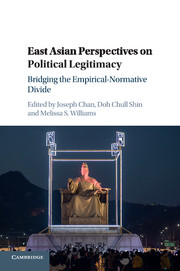Book contents
- Frontmatter
- Contents
- List of Contributors
- Preface and Acknowledgments
- 1 Political Legitimacy in East Asia: Bridging Normative and Empirical Analysis
- 2 Reasons to Obey: “Multiple Modernities” and Constructions of Political Legitimacy
- 3 Do East Asian States Enjoy a Legitimacy Premium?
- 4 Political Legitimacy in China: A Confucian Approach
- 5 Political Legitimacy in Hong Kong: A Hybrid Notion
- 6 The Evolution of Political Legitimacy in Singapore: Electoral Institutions, Governmental Performance, Moral Authority, and Meritocracy
- 7 Polarized Politics, Government Legitimacy, and Democratic Legitimacy in Taiwan
- 8 The Legitimacy of Democratic Rule in Korea: From the Perspective of the Mass Citizenry
- 9 Political Legitimacy, Satisfaction, and Japanese Democracy
- 10 Legitimacy as a Hybrid Phenomenon
- Index
3 - Do East Asian States Enjoy a Legitimacy Premium?
Published online by Cambridge University Press: 30 December 2016
- Frontmatter
- Contents
- List of Contributors
- Preface and Acknowledgments
- 1 Political Legitimacy in East Asia: Bridging Normative and Empirical Analysis
- 2 Reasons to Obey: “Multiple Modernities” and Constructions of Political Legitimacy
- 3 Do East Asian States Enjoy a Legitimacy Premium?
- 4 Political Legitimacy in China: A Confucian Approach
- 5 Political Legitimacy in Hong Kong: A Hybrid Notion
- 6 The Evolution of Political Legitimacy in Singapore: Electoral Institutions, Governmental Performance, Moral Authority, and Meritocracy
- 7 Polarized Politics, Government Legitimacy, and Democratic Legitimacy in Taiwan
- 8 The Legitimacy of Democratic Rule in Korea: From the Perspective of the Mass Citizenry
- 9 Political Legitimacy, Satisfaction, and Japanese Democracy
- 10 Legitimacy as a Hybrid Phenomenon
- Index
Summary
INTRODUCTION
We are accustomed to thinking about modern political legitimacy in terms of a rejection of the unquestioned legitimacy of the past and a ceaseless struggle for the right to rule. The term “legitimacy crisis” is indiscriminately applied to virtually every political system. States and rulers face legitimacy challenges, deficits, and failures. Any success is deemed temporary, partial, and contested. Indeed, discussion is most often framed in terms of political illegitimacy. For radical normative theorists of both left and right, there can be only political illegitimacy.
The use of comparative empirical measurements and normative theories of political obligation, however, yield different findings, namely that political legitimacy can be widespread and durable, as well as normatively justified. An analysis of the empirical causes or normative reasons for that legitimacy shows that they can be found in rational or reasonable forms of citizen response to state performance in delivering universalistic public goods such as law, democracy, development, and security.
To be sure, there are states such as North Korea or the Central Asian sultanistic regimes such as Azerbaijan and Uzbekistan whose legitimacy is derived from uncontested and effective ideological indoctrination. But such cases are sufficiently rare not to threaten modern approaches to legitimacy. The general consensus is that modern states face an innate legitimacy crisis owing to the need to justify political power to self-respecting citizens, but that they can overcome that crisis if they perform well.
East Asia states, however, stand as a possible refutation of modern approaches to legitimacy because they may enjoy greater legitimacy than their performance merits and because this “legitimacy premium” cannot be attributed to ideological indoctrination. A long tradition in the study of East Asian politics argues that states and regimes in the region enjoy a widely accepted legitimacy owing to a pervasive political culture that supports the primacy of the state as the embodiment of natural order. The fourteen major countries of the region (China, North Korea, South Korea, Japan, Taiwan, Vietnam, Thailand, Cambodia, Laos, Myanmar, the Philippines, Malaysia, Singapore, and Indonesia) seem to have an uncanny ability to legitimate their rule, often despite serious performance failings. The reason, it is surmised, is a high degree of acceptance of the state by society, which owes its existence to the particularities of state formation in East Asia.
- Type
- Chapter
- Information
- East Asian Perspectives on Political LegitimacyBridging the Empirical-Normative Divide, pp. 55 - 77Publisher: Cambridge University PressPrint publication year: 2016
- 1
- Cited by

